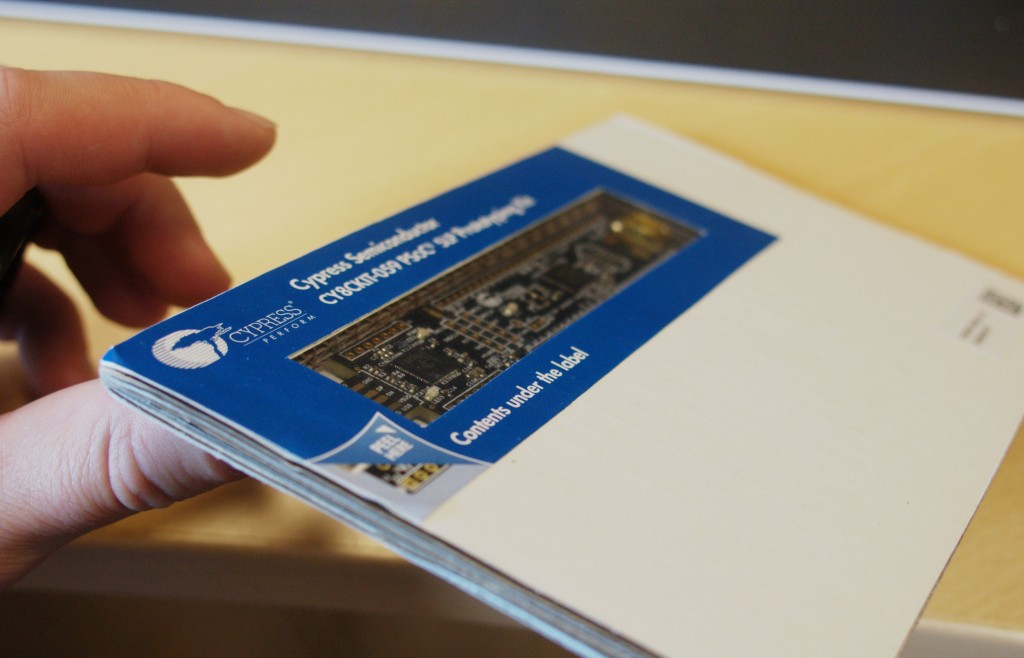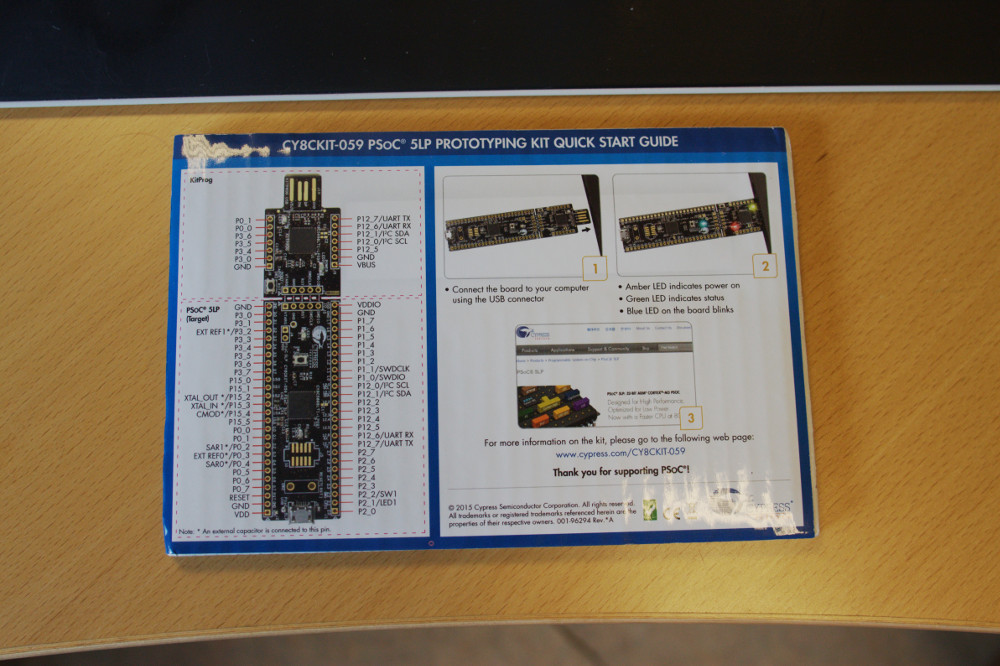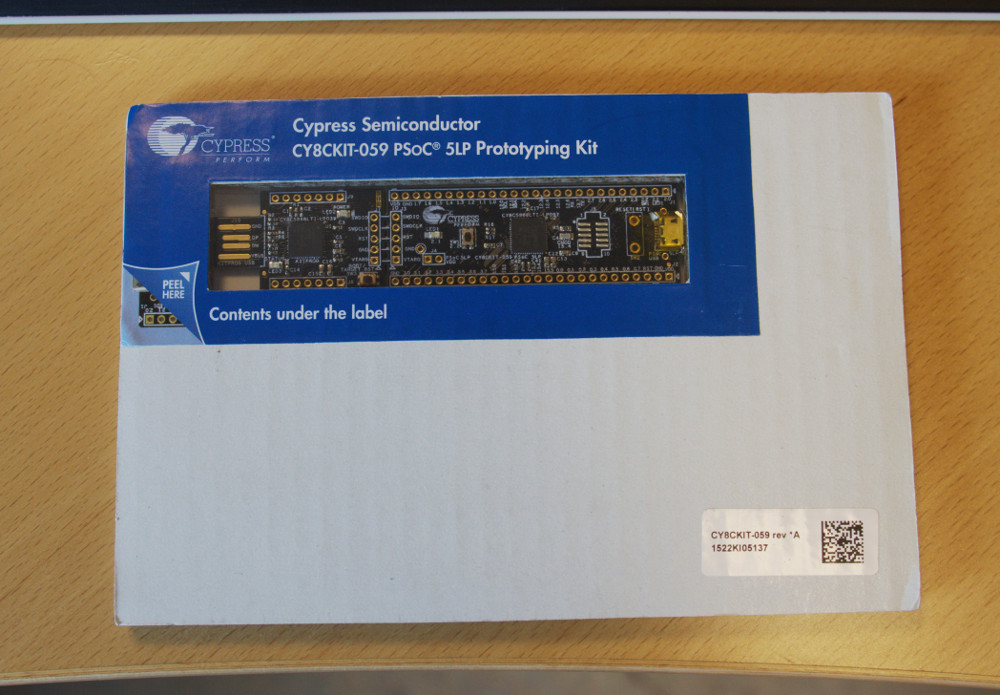(This was a draft I write in 2015, thought I might as well publish it where I’d left it)
Cool packaging, just like in the PSoC5LP kit. Despite looking similar, with a breakoff section that plugs into USB, the “programmer” side actually isn’t. It’s Cypress’s USB Serial bridge chip, the CY7C65211, and you program by using the UART bootloader on the PSoC 4200 target. Totally functional, totally valid. Not nearly as useful as a full debugger for application development of course, but in effect, it’s a full eval board for the usb serial chip. You can get a config tool that turns it into USB-SPI, USB-I2C, and USB-GPIO dongles. Neat, but still, I didn’t get this to evaluate usb serial bridge chips. On the bright side, it does at least detect properly out of the box as a serial UART in linux. (Unlike the KitProg on the PSoC5LP kit)
Tag Archives: unboxing
Cypress CY8CKIT-049-42XX – PSoC 4200 kit – first impressions
Cypress CY8CKIT-059 PSoC 5LP proto kit – first impressions
Love the packaging! I got this CY8CKIT-059 PSoC 5LP proto kit, and the CY8CKIT-049-42xx, the PSoC 4 proto kit, as they’re both super cheap, and they both came in rather excellent packaging. The pcb is behind a peel off window, in a cutout of a sandwich of three sheets of corrugated cardboard. The backside has a nice graphical layout with pins labelled, and some basic info on where to get more info. Very nice, compact, easy to ship, well done Cypress.

Of course, that’s about all that’s nice. The PSoC family seems interesting, I’ve been wanting to play with them for a while, but Cypress has absolutely zero linux support, and because of the configurable nature of the device, you really do seem to need to use their windows PSoC Creator tool. Allegedly once you’ve designed your system, you can edit the code portions freely, but it seems a long way off. OpenOCD has support for the flash in the PSoC 4 family, but nothing (yet) for the flash, and definitely no support for the KitProg programming dongle. That KitProg does seem like a nice bit of gear in it’s own right though, it’s USB2I2C, USB2UART, SWD debug adapter, on a little snap off portion of the board. However, even the USB2UART portion fails to be recognised as CDC-ACM in linux, presumably due to a bug in the descriptors. lsusb implies that they’re trying to be CDC-ACM. This one will have to be on the shelf for quite a while I’d imagine.
Full lsusb output for posterity here:
Bus 003 Device 011: ID 04b4:f139 Cypress Semiconductor Corp.
Device Descriptor:
bLength 18
bDescriptorType 1
bcdUSB 2.00
bDeviceClass 239 Miscellaneous Device
bDeviceSubClass 2 ?
bDeviceProtocol 1 Interface Association
bMaxPacketSize0 8
idVendor 0x04b4 Cypress Semiconductor Corp.
idProduct 0xf139
bcdDevice 2.0b
iManufacturer 1 Cypress Semiconductor
iProduct 2 Cypress KitProg
iSerial 128 1C210338012E4400
bNumConfigurations 1
Configuration Descriptor:
bLength 9
bDescriptorType 2
wTotalLength 130
bNumInterfaces 4
bConfigurationValue 1
iConfiguration 2 Cypress KitProg
bmAttributes 0x80
(Bus Powered)
MaxPower 400mA
Interface Descriptor:
bLength 9
bDescriptorType 4
bInterfaceNumber 0
bAlternateSetting 0
bNumEndpoints 2
bInterfaceClass 3 Human Interface Device
bInterfaceSubClass 0 No Subclass
bInterfaceProtocol 0 None
iInterface 3 KitBridge
HID Device Descriptor:
bLength 9
bDescriptorType 33
bcdHID 1.11
bCountryCode 0 Not supported
bNumDescriptors 1
bDescriptorType 34 Report
wDescriptorLength 43
Report Descriptors:
** UNAVAILABLE **
Endpoint Descriptor:
bLength 7
bDescriptorType 5
bEndpointAddress 0x83 EP 3 IN
bmAttributes 3
Transfer Type Interrupt
Synch Type None
Usage Type Data
wMaxPacketSize 0x0040 1x 64 bytes
bInterval 1
Endpoint Descriptor:
bLength 7
bDescriptorType 5
bEndpointAddress 0x04 EP 4 OUT
bmAttributes 3
Transfer Type Interrupt
Synch Type None
Usage Type Data
wMaxPacketSize 0x0040 1x 64 bytes
bInterval 1
Interface Descriptor:
bLength 9
bDescriptorType 4
bInterfaceNumber 1
bAlternateSetting 0
bNumEndpoints 2
bInterfaceClass 255 Vendor Specific Class
bInterfaceSubClass 0
bInterfaceProtocol 0
iInterface 5 KitProg Programmer
Endpoint Descriptor:
bLength 7
bDescriptorType 5
bEndpointAddress 0x81 EP 1 IN
bmAttributes 2
Transfer Type Bulk
Synch Type None
Usage Type Data
wMaxPacketSize 0x0040 1x 64 bytes
bInterval 0
Endpoint Descriptor:
bLength 7
bDescriptorType 5
bEndpointAddress 0x02 EP 2 OUT
bmAttributes 2
Transfer Type Bulk
Synch Type None
Usage Type Data
wMaxPacketSize 0x0040 1x 64 bytes
bInterval 0
Interface Association:
bLength 8
bDescriptorType 11
bFirstInterface 2
bInterfaceCount 2
bFunctionClass 2 Communications
bFunctionSubClass 0
bFunctionProtocol 0
iFunction 0
Interface Descriptor:
bLength 9
bDescriptorType 4
bInterfaceNumber 2
bAlternateSetting 0
bNumEndpoints 1
bInterfaceClass 2 Communications
bInterfaceSubClass 2 Abstract (modem)
bInterfaceProtocol 0 None
iInterface 4 KitProg USBUART
CDC Header:
bcdCDC 1.10
CDC ACM:
bmCapabilities 0x02
line coding and serial state
CDC Union:
bMasterInterface 2
bSlaveInterface 1
CDC Call Management:
bmCapabilities 0x00
bDataInterface 1
Endpoint Descriptor:
bLength 7
bDescriptorType 5
bEndpointAddress 0x85 EP 5 IN
bmAttributes 3
Transfer Type Interrupt
Synch Type None
Usage Type Data
wMaxPacketSize 0x0008 1x 8 bytes
bInterval 2
Interface Descriptor:
bLength 9
bDescriptorType 4
bInterfaceNumber 3
bAlternateSetting 0
bNumEndpoints 2
bInterfaceClass 10 CDC Data
bInterfaceSubClass 0 Unused
bInterfaceProtocol 0
iInterface 4 KitProg USBUART
Endpoint Descriptor:
bLength 7
bDescriptorType 5
bEndpointAddress 0x86 EP 6 IN
bmAttributes 2
Transfer Type Bulk
Synch Type None
Usage Type Data
wMaxPacketSize 0x0040 1x 64 bytes
bInterval 0
Endpoint Descriptor:
bLength 7
bDescriptorType 5
bEndpointAddress 0x07 EP 7 OUT
bmAttributes 2
Transfer Type Bulk
Synch Type None
Usage Type Data
wMaxPacketSize 0x0040 1x 64 bytes
bInterval 0
Device Status: 0x0000
(Bus Powered)
$
The KitProg also has a bootloader of some form, if you hold down reset while plugging it in, though it times out and reboots normally after a couple of seconds idle.
Bus 003 Device 012: ID 04b4:f13b Cypress Semiconductor Corp.
Device Descriptor:
bLength 18
bDescriptorType 1
bcdUSB 2.00
bDeviceClass 0 (Defined at Interface level)
bDeviceSubClass 0
bDeviceProtocol 0
bMaxPacketSize0 8
idVendor 0x04b4 Cypress Semiconductor Corp.
idProduct 0xf13b
bcdDevice 1.00
iManufacturer 1 Cypress Semiconductor
iProduct 4 KitProg Bootloader
iSerial 128 1C210338012E4400
bNumConfigurations 1
Configuration Descriptor:
bLength 9
bDescriptorType 2
wTotalLength 41
bNumInterfaces 1
bConfigurationValue 1
iConfiguration 2 Configuration 0x0001
bmAttributes 0x80
(Bus Powered)
MaxPower 500mA
Interface Descriptor:
bLength 9
bDescriptorType 4
bInterfaceNumber 0
bAlternateSetting 0
bNumEndpoints 2
bInterfaceClass 3 Human Interface Device
bInterfaceSubClass 0 No Subclass
bInterfaceProtocol 0 None
iInterface 3 Interface 0x0001
HID Device Descriptor:
bLength 9
bDescriptorType 33
bcdHID 1.11
bCountryCode 0 Not supported
bNumDescriptors 1
bDescriptorType 34 Report
wDescriptorLength 36
Report Descriptors:
** UNAVAILABLE **
Endpoint Descriptor:
bLength 7
bDescriptorType 5
bEndpointAddress 0x01 EP 1 OUT
bmAttributes 3
Transfer Type Interrupt
Synch Type None
Usage Type Data
wMaxPacketSize 0x0040 1x 64 bytes
bInterval 1
Endpoint Descriptor:
bLength 7
bDescriptorType 5
bEndpointAddress 0x82 EP 2 IN
bmAttributes 3
Transfer Type Interrupt
Synch Type None
Usage Type Data
wMaxPacketSize 0x0040 1x 64 bytes
bInterval 1
Device Status: 0x0000
(Bus Powered)
SiLabs EFM32 Happy Gecko starter kit – first impressions
More unboxing. It includes a CR2032 coin cell in the box. Handy when the product line’s premise is ultra low power. It includes two usb cables, one mini, one micro. What the hell. why are you using mixed connectors?! (One for debug, one for user, similar to the original STM32F4 discovery)
Nice looking board, nice screen. Factory demo software is space invaders! Nice demo of touch buttons, physical buttons and the screen. Startup screen shows the debugger state as well. Expansion header seems to have a full silkscreen with correct positioning. Debug connector for connecting your own debug hardware is the full ARM Cortex with trace header, 2×10@1.27mm pitch. This is somewhat unusual, I’ve never had one that broke out the full ETM pins.
The kit user guide implies that there’s a USB flash drive in the box, containing simplicity studio. Thankfully that’s not the case. That would have been really wasteful. (Yes, yes, helpful for some people with shitty internet, but incredibly wasteful for everyone else)
The onboard JLink OB also presents a mass storage device, with a (broken) mbed link, a link to the starter kit’s home page, and a link to simplicity studio’s homepage. Rather shitty filenames, but I guess that helped someone’s day :) Bit lame about the mbed link not working though. It looks like something that mbed setup to be permanent, but someone overlooked somewhere: http://mbed.org/device/?code=200501120000B7A4D74B847B (Update: It might actually work, but mbed’s website was hacked at the time of writing….)
The rest of the kit user guide doc is rather sparse, (to be polite) simply containing some screenshots of how to run demos and get more information from within Simplicity studio. The kit home page does have a link to download the schematics though, that’s nice.
Doesn’t work with OpenOCD at the time of writing, but very basic preliminary support is proposed in http://openocd.zylin.com/#/c/2931/
Atmel SAMD10 Xplained mini board review
Got a pile of dev boards for some testing. Some first impressions of the ATSAMD10-XMINI. First off, it’s nice and cheap, $9 or so. Comes in a really small cardboard box, with absolutely no documentation beyond some links on the box. Totally fine, no need for anything else these days. The board is a somewhat unusual shape, with the micro usb connector for the onboard DDBG (CMSIS-DAP) protruding out the back. Whatever. At first glace, the board appears well labelled. A closer glance….. well…
The user guide for this board refers to all the headers as JXXX. The J number is NOT in the silk on the board. The userguide has a picture of the board, and marks some of the J headers, but not all. The rest you have to just sort of figure out. This seems like a really amateur oversight. Fixing the silk would have been ideal, but at least the documentation could have a better overview of the board! (The userguide does manage to include screenshots of how to install atmel FLIP, which seems like a total waste of space for this document)
The user guide refers to the pins with J200-1, -2, -3, etc. The silk on the pad arrays is just numbered 1..5, and A..P. There’s silk on the back describing some pins, no idea why some and not others. There’s a big box of silk on the back that seems to be describing some pins, but no idea which, or what order.
There’s a specially boxed off section of pads in the top right, 2×10. It’s unlabeled. No idea what it’s for. (Update, turns out this is for Xplained Pro addons, the userguide covers this, and actually uses the grid array notation that matches the board.)
The user guide does (un)helpfully include arduino pin numbers, for the arduino compatible pin arrays, but there’s no mention of arduino software, or linked anywhere, so who cares about that. The column in the table that includes this is unlabeled as well.
The factory firmware is a morse application. Connecting to the CDC-ACM uart provided by the EDBG module lets you blink out letters, and tapping in keys on the user button prints them to the uart. It resets every few seconds idle and prints some help text. Neat enough.
The user guide does NOT include the schematic of the board. This is a serious omission. Particularly given the poor documentation/silk screen match up, but also as these boards are often used as examples for your own projects. A snippet of the power supply section is included, but again, the labels don’t match the board. I went back and forth through the user guide a few times to make sure I wasn’t missing anything. However, the software package download, which I skipped initially, actually includes no software. It includes all the schematics and proper board diagrams that should have been in the user guide. Pretty poor form Atmel :|
No comments on the tools or device itself yet, that’s for a much later date :)

